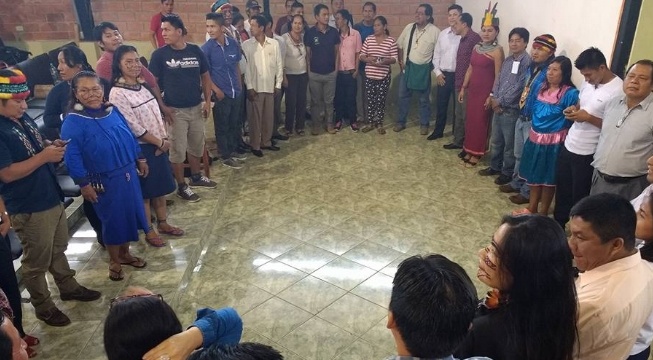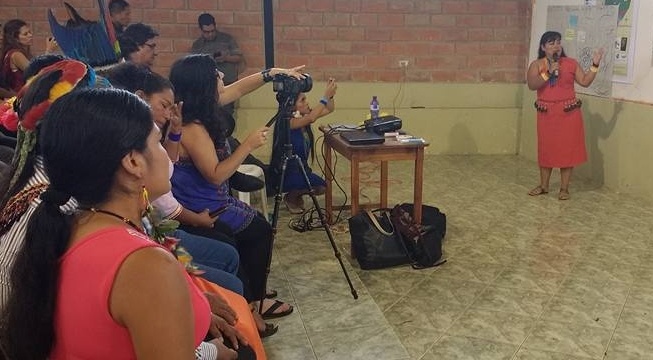Sacred Headwaters Project is Weaving Indigenous Communities Together
 At a two-day assembly, indigenous nationality representatives from the Ecuadorian Amazon aligned on how important it was that they all stand together for the Sacred Headwaters Initiative.
At a two-day assembly, indigenous nationality representatives from the Ecuadorian Amazon aligned on how important it was that they all stand together for the Sacred Headwaters Initiative.
When the initiative to protect the Sacred Headwaters region of the Amazon first began in the planning phase in 2016, Pachamama Alliance along with other organizations began focusing on building a coalition of key stakeholders (indigenous groups, local governments, international NGOs), aligning on a common vision for the Initiative, and focusing on opportunities to build the capacity of the indigenous people to manage this area.
Building indigenous alignment around and for the Initiative has always been a key focus, however the commitment of the indigenous people to the Sacred Headwaters Initiative has emerged even sooner and stronger than was initially imagined.
The indigenous communities of the Sacred Headwaters region are clear that they don't want industrial level extractive activities (mining and oil drilling) in their lands and they now see the coordinating regional vision of the Sacred Headwaters Initiative as one of the best structures to protect their future.
The indigenous communities in Ecuador have been convening and successfully moving the Initiative forward through the close oversight of CONFENIAE, AIDESEP, and COICA, the regional indigenous governing bodies for Ecuador, Peru, and the Amazon basin, respectfully.
COICA (Coordinator of Indigenous Organizations of the Amazon River Basin), held a congress in Ecuador in March where they solidified and endorsed the Sacred Headwaters Initiative and are now working to help generate funding and to support some of the technical working groups of the Initiative. Indigenous community representatives from Ecuador's Amazon attending and presenting at a two-day assembly on the Sacred Headwaters Initiative
Indigenous community representatives from Ecuador's Amazon attending and presenting at a two-day assembly on the Sacred Headwaters Initiative
CONFENIAE—the governing federation for Ecuador’s Amazonian indigenous people has stepped-up and been taking more of a lead on the Initiative. On June 4 and 5 in Ecuador, near the Amazonian frontier town of Tena, they held a two-day assembly on the Sacred Headwaters Initiative. This was attended by nearly all of the indigenous nationalities in Ecuador’s Amazon as well as outside allies like Pachamama Alliance and Amazon Watch. The various nationalities aligned on how important it was that they all stand together for the Sacred Headwaters Initiative. They also aligned on a written set of resolutions that declare their commitment to the Initiative as the best way to protect their lands and culture, to attract financial and technical support for economic and social development projects in their territories, and to gain the cooperation and partnership of the government to protect the rights of nature and to protect rights of indigenous peoples.
There have been several meetings in Peru in this past year where leaders from CONFENIAE met with leaders from AIDESEP (Interethnic Association for the Development of the Peruvian Rainforest) to discuss the Sacred Headwaters. The AIDESEP leaders have endorsed the Initiative but now the work that needs to be done is to educate the base communities, work that has been done over the past year in Ecuador. Because the Sacred Headwaters region in Peru is so large and transportation is so difficult, two meetings, similar to the one in Tena, will be hosted by AIDESEP later this summer in Peru. Leaders from CONFENIAE and representatives from Pachamama Alliance and Amazon Watch will attend those meetings. Hopefully those gatherings will issue declarations of solidarity from the indigenous people of Peru similar to the one from Ecuador.
Read the translated declaration below
********
CONFENIAE’S ASSEMBLY OF THE SACRED HEADWATERS INITIATIVE
The Sacred Headwaters of the Amazon is a bi-national initiative promoted by the indigenous nationalities of the Amazon, represented by CONFENIAE and AIDESEP, the indigenous federations of the Amazon region of Ecuador and Peru. It constitutes a model initiative that promotes indigenous self-determination and a different vision of the governance and regional development in the Amazon.
Therefore, the Confederation of the Indigenous Nationalities of the Ecuadorian Amazon (CONFENIAE), the presidents and representatives of the indigenous nationalities, communities and Amazon entrepreneurships, gathered in Assembly on June 4, 2018, in the Rukullakta community, resolved to:
- Present the Sacred Headwaters Initiative of the Napo and Marañón Rivers to the national and international public as a binational proposal for the protection and sustainable development of a cultural bioregion comprised of the Ecuadorian and Peruvian Amazon, based on the organizational and political structure of CONFENIAE as well as a framework that respects indigenous peoples’ rights and the rights of nature.
- Raise awareness about the work the indigenous organizations carry out in their territories related to their own governance and the development of new forms of economic opportunities that are not based on the exploitation of non-renewables, such as oil and mining resources.
- Maintain and disseminate the cultural identity and ancestral knowledge of Amazonian indigenous peoples living in the Sacred Headwaters of the Napo and the Marañón region.
- Work together with the organizations and technical teams of the Amazon indigenous nationalities to move forward with regional planning, indigenous life plans and economic incentives so that the Governments of Ecuador and Peru support the vision of the Sacred Headwaters of the Napo and the Marañón rivers, and promote the initiative throughout the rest of the world.
- Carry out diagnostics and deep field research in order to identify the socio-economic reality of communities and families, as well as the development of cartography that will contribute to updating life plans, management plans, establishment of indigenous territorial circumscriptions and areas of conservation for Amazonian indigenous peoples, through the technical teams of CONFENIAE and indigenous nationalities. These tools will also allow for the development of proposals and projects that can be funded from the public and private sectors.
- Promote cooperation with public and private institutions interested in investing in and promoting the production and marketing of agroecological and artisanal products, community tourism, traditional medicines, and spiritual healing centers at regional, national and international scale, to generate greater sources of income for the local producers in the Amazon.
- Have the Government Councils of the Indigenous Nationalities commit to be the main spokesmen for the Sacred Headwaters Initiative in the territories, so that communities have sufficient information and can be participants in the creation and implementation of the technical, economic and social framework of the Initiative.
- Declare the territories of indigenous nationalities as a sacred space for life, labeled as an alternate category of protection where their land rights are respected and recognized by national governments and internationally.
- Demand the national governments to hear and implement all the resolutions related to indigenous peoples and the rights of nature. In this sense, it is required that public policies should support the processes of restoration, reforestation and decontamination along the Amazon river basins that are part of the Sacred Headwaters Initiative.
- Propose the creation of a Regional Alliance for co-management in order to ensure the implementation of the Sacred Headwaters initiative and local proposals of communities and indigenous nationalities, and advocate for the generation of public policies favorable to nature conservation and sustainable development.
We appeal to the Presidents of the States that compose OTCA (Organization of the Amazon Cooperation Treaty) who will meet in June 2018, to provide a space for a conversation between states and indigenous peoples represented by AIDESEP and CONFENIAE, where the Sacred Headwaters Initiative could be presented and backed through public policies for its implementation.